Business and Professional Ethics: Robots, Taxes, and Ethical Dilemmas
VerifiedAdded on 2022/09/17
|6
|1068
|18
Essay
AI Summary
This essay delves into the ethical considerations surrounding the automation of jobs and the potential taxation of robots. It explores the differences between Kantian and Utilitarian ethics, applying these frameworks to the debate over whether businesses deploying robots should be taxed to offset job losses. The essay examines arguments for and against robot taxation, referencing Bill Gates' perspective and considering the potential impact on employment and the greater good. It highlights the complexities of ethical decision-making in the context of technological advancements, discussing the practical challenges and potential benefits of such a tax, as well as the safety concerns related to robots. The essay provides a comprehensive analysis of the topic, drawing on various sources and ethical theories to offer a balanced perspective on this contemporary issue.
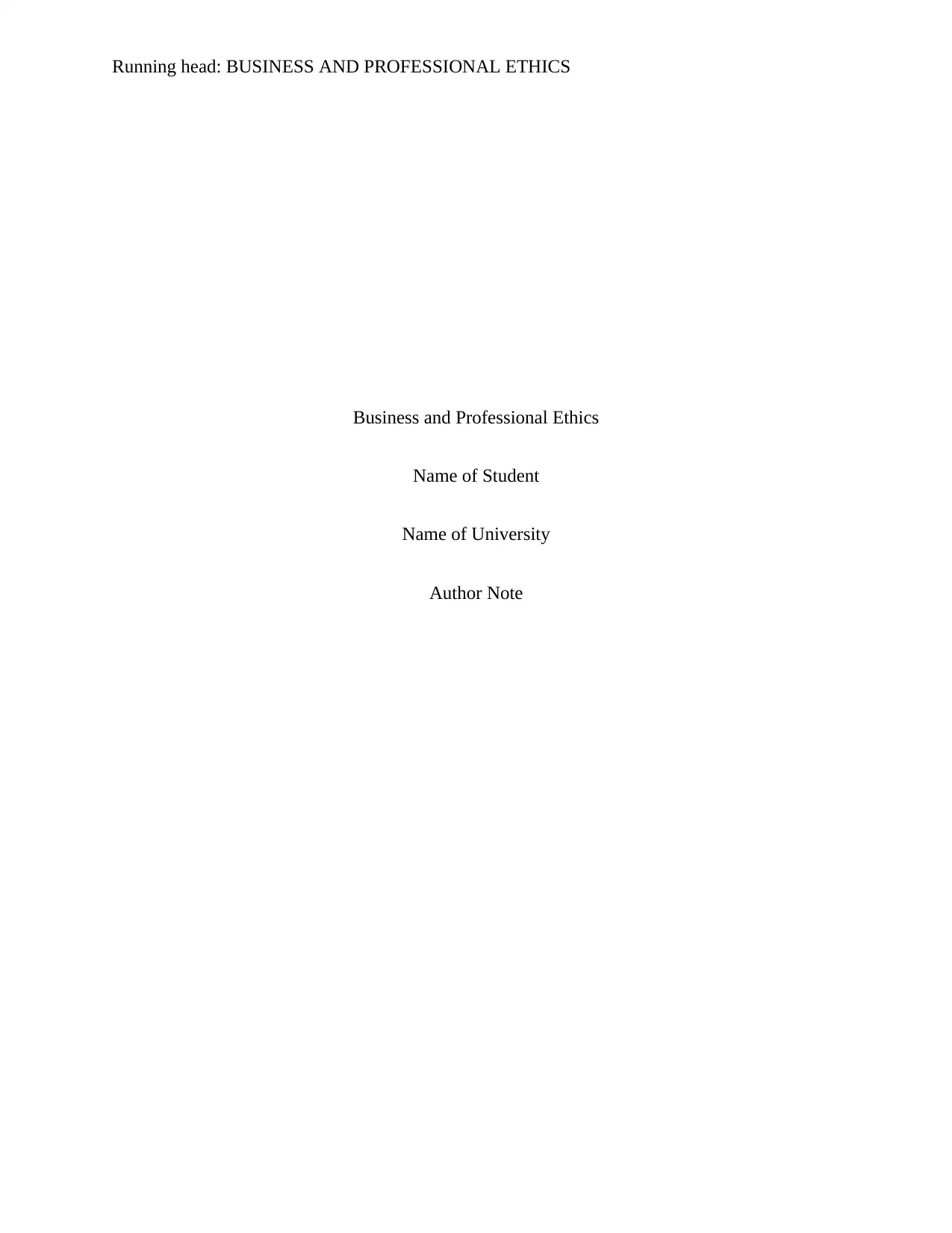
Running head: BUSINESS AND PROFESSIONAL ETHICS
Business and Professional Ethics
Name of Student
Name of University
Author Note
Business and Professional Ethics
Name of Student
Name of University
Author Note
Paraphrase This Document
Need a fresh take? Get an instant paraphrase of this document with our AI Paraphraser
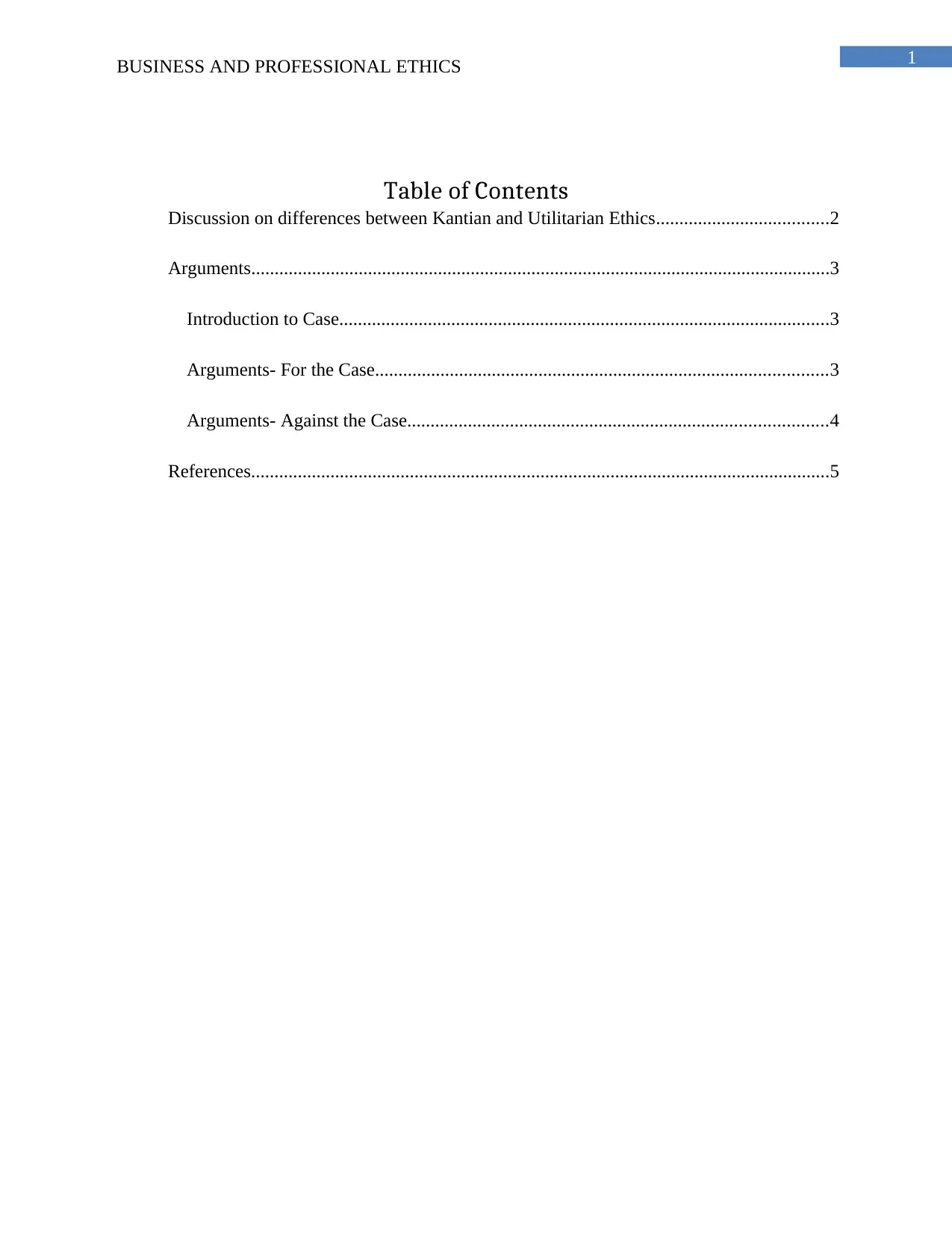
1BUSINESS AND PROFESSIONAL ETHICS
Table of Contents
Discussion on differences between Kantian and Utilitarian Ethics.....................................2
Arguments............................................................................................................................3
Introduction to Case.........................................................................................................3
Arguments- For the Case.................................................................................................3
Arguments- Against the Case..........................................................................................4
References............................................................................................................................5
Table of Contents
Discussion on differences between Kantian and Utilitarian Ethics.....................................2
Arguments............................................................................................................................3
Introduction to Case.........................................................................................................3
Arguments- For the Case.................................................................................................3
Arguments- Against the Case..........................................................................................4
References............................................................................................................................5
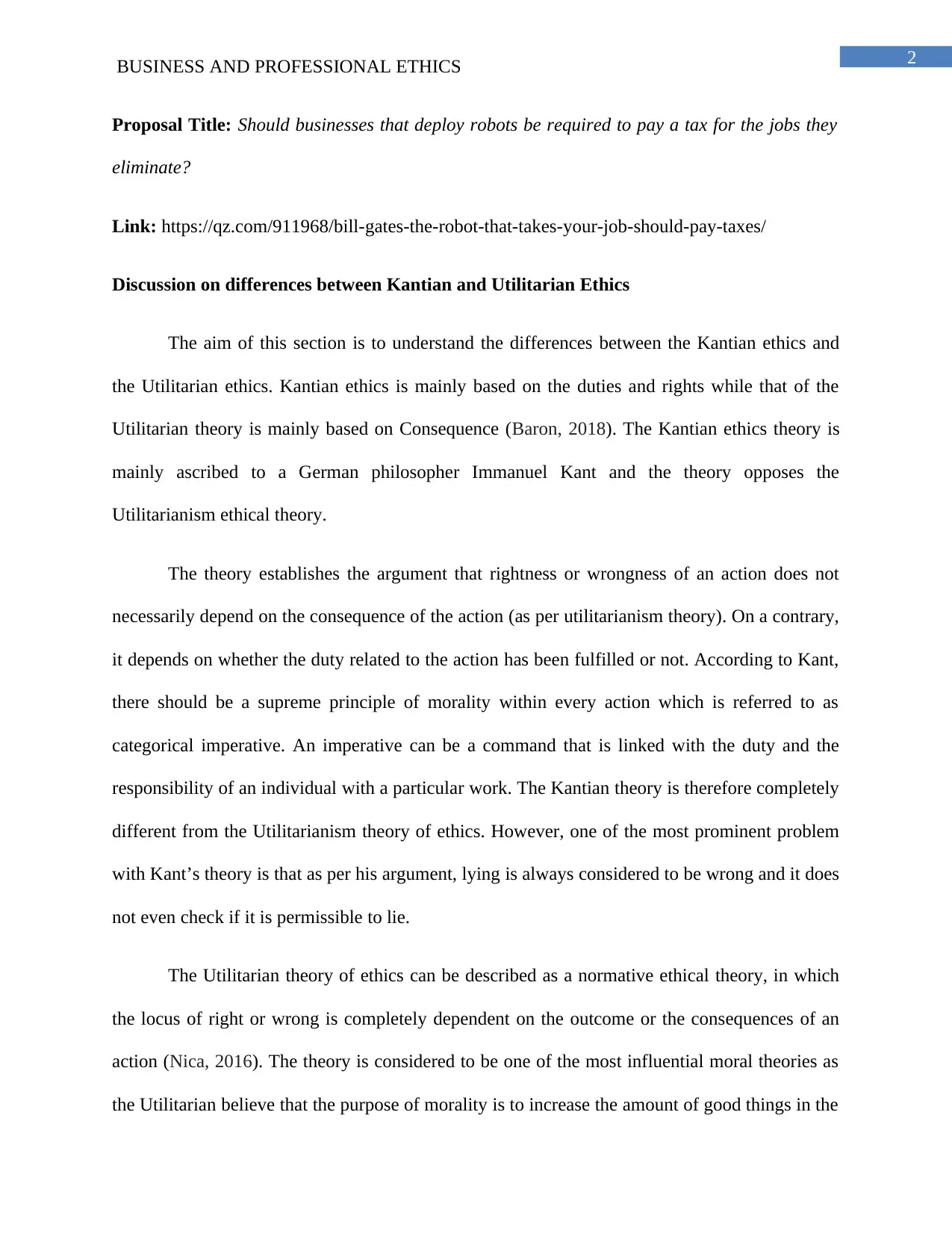
2BUSINESS AND PROFESSIONAL ETHICS
Proposal Title: Should businesses that deploy robots be required to pay a tax for the jobs they
eliminate?
Link: https://qz.com/911968/bill-gates-the-robot-that-takes-your-job-should-pay-taxes/
Discussion on differences between Kantian and Utilitarian Ethics
The aim of this section is to understand the differences between the Kantian ethics and
the Utilitarian ethics. Kantian ethics is mainly based on the duties and rights while that of the
Utilitarian theory is mainly based on Consequence (Baron, 2018). The Kantian ethics theory is
mainly ascribed to a German philosopher Immanuel Kant and the theory opposes the
Utilitarianism ethical theory.
The theory establishes the argument that rightness or wrongness of an action does not
necessarily depend on the consequence of the action (as per utilitarianism theory). On a contrary,
it depends on whether the duty related to the action has been fulfilled or not. According to Kant,
there should be a supreme principle of morality within every action which is referred to as
categorical imperative. An imperative can be a command that is linked with the duty and the
responsibility of an individual with a particular work. The Kantian theory is therefore completely
different from the Utilitarianism theory of ethics. However, one of the most prominent problem
with Kant’s theory is that as per his argument, lying is always considered to be wrong and it does
not even check if it is permissible to lie.
The Utilitarian theory of ethics can be described as a normative ethical theory, in which
the locus of right or wrong is completely dependent on the outcome or the consequences of an
action (Nica, 2016). The theory is considered to be one of the most influential moral theories as
the Utilitarian believe that the purpose of morality is to increase the amount of good things in the
Proposal Title: Should businesses that deploy robots be required to pay a tax for the jobs they
eliminate?
Link: https://qz.com/911968/bill-gates-the-robot-that-takes-your-job-should-pay-taxes/
Discussion on differences between Kantian and Utilitarian Ethics
The aim of this section is to understand the differences between the Kantian ethics and
the Utilitarian ethics. Kantian ethics is mainly based on the duties and rights while that of the
Utilitarian theory is mainly based on Consequence (Baron, 2018). The Kantian ethics theory is
mainly ascribed to a German philosopher Immanuel Kant and the theory opposes the
Utilitarianism ethical theory.
The theory establishes the argument that rightness or wrongness of an action does not
necessarily depend on the consequence of the action (as per utilitarianism theory). On a contrary,
it depends on whether the duty related to the action has been fulfilled or not. According to Kant,
there should be a supreme principle of morality within every action which is referred to as
categorical imperative. An imperative can be a command that is linked with the duty and the
responsibility of an individual with a particular work. The Kantian theory is therefore completely
different from the Utilitarianism theory of ethics. However, one of the most prominent problem
with Kant’s theory is that as per his argument, lying is always considered to be wrong and it does
not even check if it is permissible to lie.
The Utilitarian theory of ethics can be described as a normative ethical theory, in which
the locus of right or wrong is completely dependent on the outcome or the consequences of an
action (Nica, 2016). The theory is considered to be one of the most influential moral theories as
the Utilitarian believe that the purpose of morality is to increase the amount of good things in the
⊘ This is a preview!⊘
Do you want full access?
Subscribe today to unlock all pages.

Trusted by 1+ million students worldwide
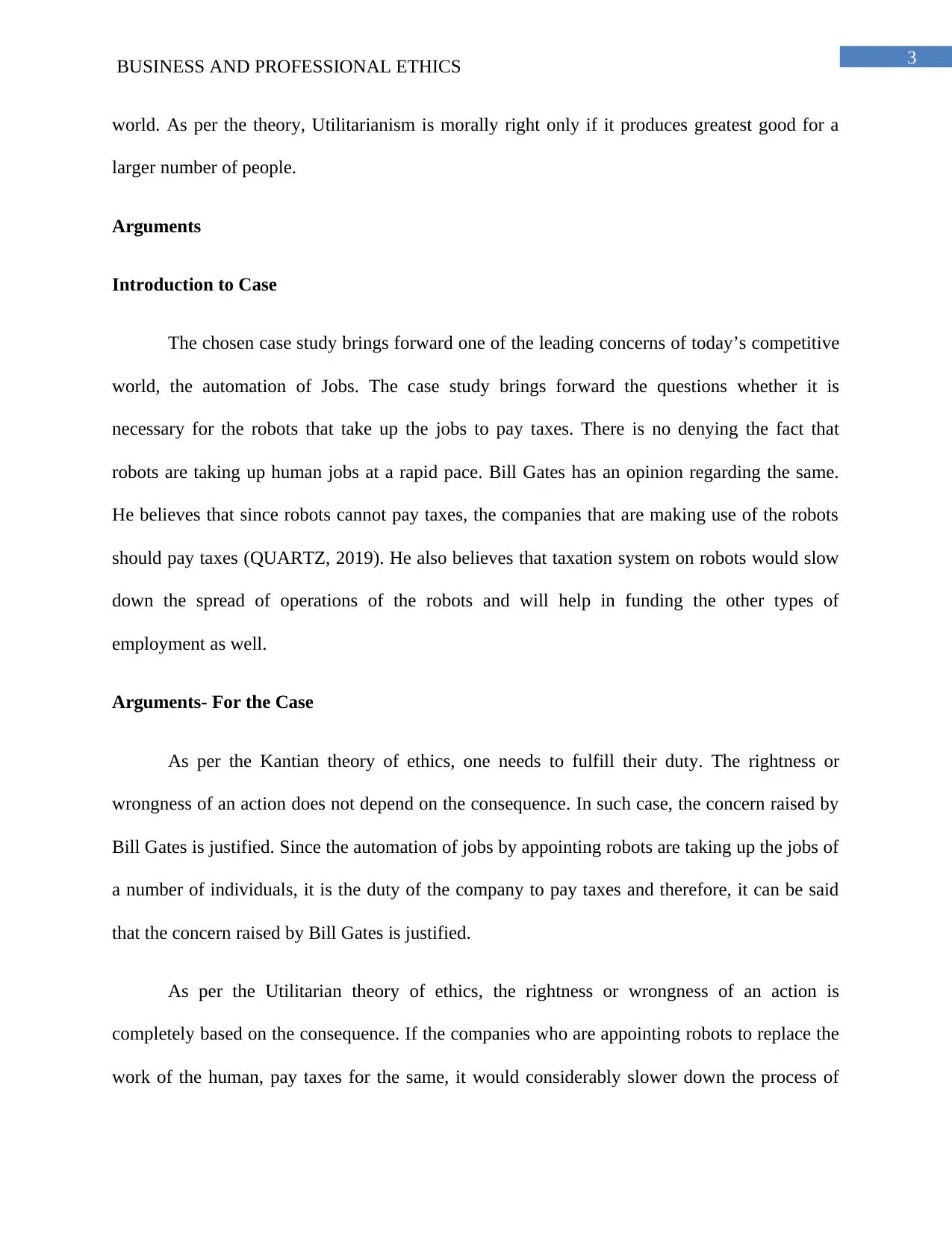
3BUSINESS AND PROFESSIONAL ETHICS
world. As per the theory, Utilitarianism is morally right only if it produces greatest good for a
larger number of people.
Arguments
Introduction to Case
The chosen case study brings forward one of the leading concerns of today’s competitive
world, the automation of Jobs. The case study brings forward the questions whether it is
necessary for the robots that take up the jobs to pay taxes. There is no denying the fact that
robots are taking up human jobs at a rapid pace. Bill Gates has an opinion regarding the same.
He believes that since robots cannot pay taxes, the companies that are making use of the robots
should pay taxes (QUARTZ, 2019). He also believes that taxation system on robots would slow
down the spread of operations of the robots and will help in funding the other types of
employment as well.
Arguments- For the Case
As per the Kantian theory of ethics, one needs to fulfill their duty. The rightness or
wrongness of an action does not depend on the consequence. In such case, the concern raised by
Bill Gates is justified. Since the automation of jobs by appointing robots are taking up the jobs of
a number of individuals, it is the duty of the company to pay taxes and therefore, it can be said
that the concern raised by Bill Gates is justified.
As per the Utilitarian theory of ethics, the rightness or wrongness of an action is
completely based on the consequence. If the companies who are appointing robots to replace the
work of the human, pay taxes for the same, it would considerably slower down the process of
world. As per the theory, Utilitarianism is morally right only if it produces greatest good for a
larger number of people.
Arguments
Introduction to Case
The chosen case study brings forward one of the leading concerns of today’s competitive
world, the automation of Jobs. The case study brings forward the questions whether it is
necessary for the robots that take up the jobs to pay taxes. There is no denying the fact that
robots are taking up human jobs at a rapid pace. Bill Gates has an opinion regarding the same.
He believes that since robots cannot pay taxes, the companies that are making use of the robots
should pay taxes (QUARTZ, 2019). He also believes that taxation system on robots would slow
down the spread of operations of the robots and will help in funding the other types of
employment as well.
Arguments- For the Case
As per the Kantian theory of ethics, one needs to fulfill their duty. The rightness or
wrongness of an action does not depend on the consequence. In such case, the concern raised by
Bill Gates is justified. Since the automation of jobs by appointing robots are taking up the jobs of
a number of individuals, it is the duty of the company to pay taxes and therefore, it can be said
that the concern raised by Bill Gates is justified.
As per the Utilitarian theory of ethics, the rightness or wrongness of an action is
completely based on the consequence. If the companies who are appointing robots to replace the
work of the human, pay taxes for the same, it would considerably slower down the process of
Paraphrase This Document
Need a fresh take? Get an instant paraphrase of this document with our AI Paraphraser
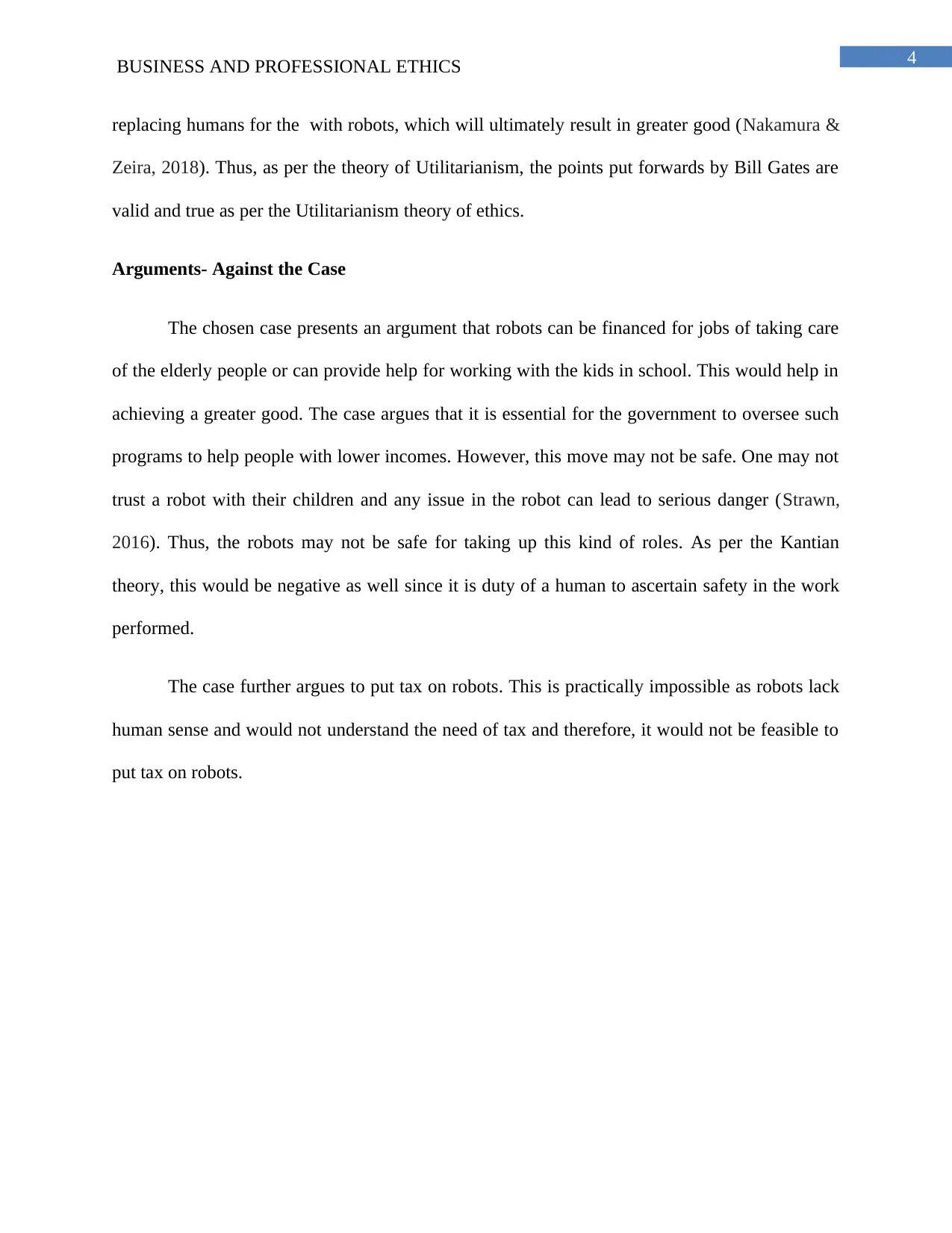
4BUSINESS AND PROFESSIONAL ETHICS
replacing humans for the with robots, which will ultimately result in greater good (Nakamura &
Zeira, 2018). Thus, as per the theory of Utilitarianism, the points put forwards by Bill Gates are
valid and true as per the Utilitarianism theory of ethics.
Arguments- Against the Case
The chosen case presents an argument that robots can be financed for jobs of taking care
of the elderly people or can provide help for working with the kids in school. This would help in
achieving a greater good. The case argues that it is essential for the government to oversee such
programs to help people with lower incomes. However, this move may not be safe. One may not
trust a robot with their children and any issue in the robot can lead to serious danger (Strawn,
2016). Thus, the robots may not be safe for taking up this kind of roles. As per the Kantian
theory, this would be negative as well since it is duty of a human to ascertain safety in the work
performed.
The case further argues to put tax on robots. This is practically impossible as robots lack
human sense and would not understand the need of tax and therefore, it would not be feasible to
put tax on robots.
replacing humans for the with robots, which will ultimately result in greater good (Nakamura &
Zeira, 2018). Thus, as per the theory of Utilitarianism, the points put forwards by Bill Gates are
valid and true as per the Utilitarianism theory of ethics.
Arguments- Against the Case
The chosen case presents an argument that robots can be financed for jobs of taking care
of the elderly people or can provide help for working with the kids in school. This would help in
achieving a greater good. The case argues that it is essential for the government to oversee such
programs to help people with lower incomes. However, this move may not be safe. One may not
trust a robot with their children and any issue in the robot can lead to serious danger (Strawn,
2016). Thus, the robots may not be safe for taking up this kind of roles. As per the Kantian
theory, this would be negative as well since it is duty of a human to ascertain safety in the work
performed.
The case further argues to put tax on robots. This is practically impossible as robots lack
human sense and would not understand the need of tax and therefore, it would not be feasible to
put tax on robots.
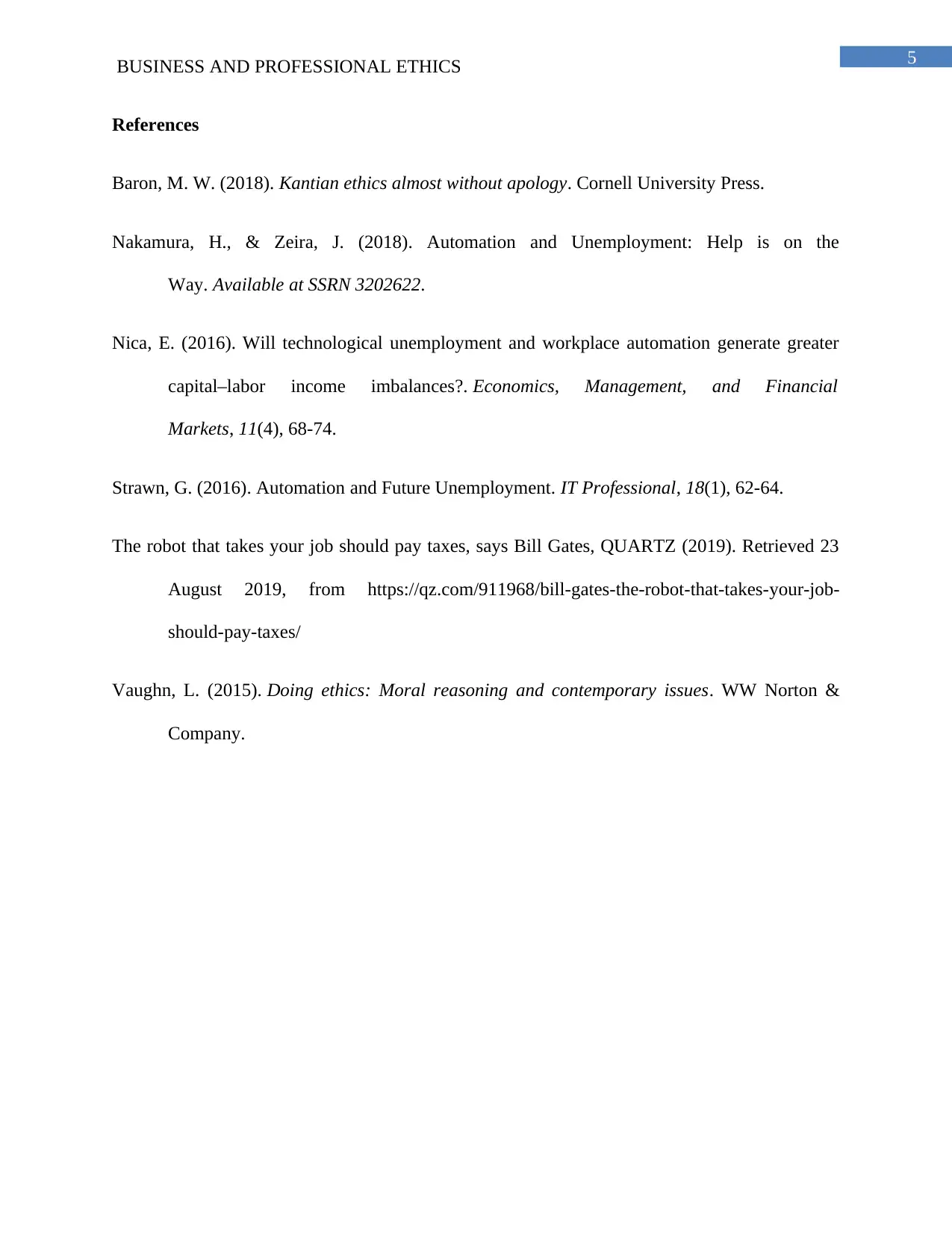
5BUSINESS AND PROFESSIONAL ETHICS
References
Baron, M. W. (2018). Kantian ethics almost without apology. Cornell University Press.
Nakamura, H., & Zeira, J. (2018). Automation and Unemployment: Help is on the
Way. Available at SSRN 3202622.
Nica, E. (2016). Will technological unemployment and workplace automation generate greater
capital–labor income imbalances?. Economics, Management, and Financial
Markets, 11(4), 68-74.
Strawn, G. (2016). Automation and Future Unemployment. IT Professional, 18(1), 62-64.
The robot that takes your job should pay taxes, says Bill Gates, QUARTZ (2019). Retrieved 23
August 2019, from https://qz.com/911968/bill-gates-the-robot-that-takes-your-job-
should-pay-taxes/
Vaughn, L. (2015). Doing ethics: Moral reasoning and contemporary issues. WW Norton &
Company.
References
Baron, M. W. (2018). Kantian ethics almost without apology. Cornell University Press.
Nakamura, H., & Zeira, J. (2018). Automation and Unemployment: Help is on the
Way. Available at SSRN 3202622.
Nica, E. (2016). Will technological unemployment and workplace automation generate greater
capital–labor income imbalances?. Economics, Management, and Financial
Markets, 11(4), 68-74.
Strawn, G. (2016). Automation and Future Unemployment. IT Professional, 18(1), 62-64.
The robot that takes your job should pay taxes, says Bill Gates, QUARTZ (2019). Retrieved 23
August 2019, from https://qz.com/911968/bill-gates-the-robot-that-takes-your-job-
should-pay-taxes/
Vaughn, L. (2015). Doing ethics: Moral reasoning and contemporary issues. WW Norton &
Company.
⊘ This is a preview!⊘
Do you want full access?
Subscribe today to unlock all pages.

Trusted by 1+ million students worldwide
1 out of 6
Related Documents
Your All-in-One AI-Powered Toolkit for Academic Success.
+13062052269
info@desklib.com
Available 24*7 on WhatsApp / Email
![[object Object]](/_next/static/media/star-bottom.7253800d.svg)
Unlock your academic potential
Copyright © 2020–2026 A2Z Services. All Rights Reserved. Developed and managed by ZUCOL.





